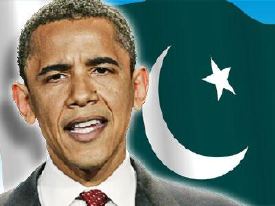 When Secretary of State, Hillary Clinton pulled the Al Qaeda card on Pakistanis during her visit to the Islamic Republic, many thought it was classic Clintonian rage unfettered. Last week, Prime Minister Gordon Brown first congratulated President Zardari on his country’s successful jihad against terrorists and then hung up the phone and told the BBC that Pakistan needs to do more against Al Qaeda. That was chalked up immediately by followers of British politics to Brown’s now legendary incompetence. Perhaps, he read the briefing notes all wrong, or forgot to take his medication, we all thought. After all, this is the man that has single-handedly brought the greatest era of Labour politics and its dominance in Britain to a pathetic end.
When Secretary of State, Hillary Clinton pulled the Al Qaeda card on Pakistanis during her visit to the Islamic Republic, many thought it was classic Clintonian rage unfettered. Last week, Prime Minister Gordon Brown first congratulated President Zardari on his country’s successful jihad against terrorists and then hung up the phone and told the BBC that Pakistan needs to do more against Al Qaeda. That was chalked up immediately by followers of British politics to Brown’s now legendary incompetence. Perhaps, he read the briefing notes all wrong, or forgot to take his medication, we all thought. After all, this is the man that has single-handedly brought the greatest era of Labour politics and its dominance in Britain to a pathetic end.
But of course, Secretary Clinton (being the Obama administration’s sharp-toothed diplomatic supremo) and PM Brown (continuing Tony Blair’s legacy of being the US government’s poodle) were just setting up the ball for Obama to smash. Unlike what we’ve come to expect from President Obama, however, this was no smash. A less thunderous or less effective Obama speech is hard to conceive of.
If President Obama is the Muhammad Ali of political oratory, then his much-anticipated Afghan strategy speech was, at least to his admirers (even those from faraway places like Islamabad) as bitter as Ali’s 1971 loss to Joe Frazier at Madison Square Garden. It was his first grand failure. In the past, Obama’s oratory skills have helped him do the things he was looking to get done (Reverend Wright, Election Night, healthcare). His effectiveness is borne of the clarity he creates and the trust he engenders.
At West Point on Tuesday, President Obama was least like himself than we’ve ever known him. He was guarded, defensive, and less than entirely convincing. The biggest reason for the speech’s failure is that it deliberately skirted around the central issue that plagues the American war in Afghanistan.
If there is one overwhelming area of consensus among pundits that think about these things for a living, it is concerning where the epicenter of America’s problem in Afghanistan lies. That place is Pakistan. More specifically, it is Pakistan’s willingness and its ability to take on and defeat, decisively, those terrorists that would either themselves, or through proxies, seek to harm the United States.
President Obama’s speech almost entirely ignored this aspect of his country’s Afghanistan strategy. Where he didn’t ignore it, he fudged the issues so grandly that his talking points were eerily similar to some of the most emphatically unrealistic analysis of what is going on in Pakistan these days. In the most distressing part of Obama’s speech, he repeated the spurious link between extremism and the security problems in Pakistan, saying “…as innocents have been killed from Karachi to Islamabad, it has become clear that it is the Pakistani people who are the most endangered by extremism. Public opinion has turned. The Pakistani Army has waged an offensive in Swat and South Waziristan. And there is no doubt that the United States and Pakistan share a common enemy.”
Pakistani public opinion is decidedly against extremist groups and extremism — but even a cursory look at the data and the news would disabuse anyone of the notion that Pakistan and the United States face a common enemy.
For Pakistani decision makers (and cynics are welcome to insert all the acronyms here that they like, but the fact is that the military and politics of this country are ultimately inextricable) Pakistan’s enemies are those terrorists that are killing Pakistanis. America’s enemies are those that are killing Americans.
It is true that Pakistanis are getting killed at the hands of FATA-based terrorists, and that Americans (soldiers) are getting killed at the hands of FATA-based terrorists. That is about where the similarities end.
The FATA-based terrorists that attack Pakistan have been, and will continue to be, hunted down by the Pakistani military because it makes eminent political and strategic sense to do that. But the terrorists that operate in Afghanistan (from FATA), seeking to kill American soldiers in Afghanistan do not pose a threat to Pakistan. At least, that is what the calculus of Pakistani decision makers has been, and will continue to be for the foreseeable future. Pakistan might take action against them, off and on, but will do so purely as a secondary proxy for American military power. The Pakistani military, in that case, will represent a better investment for US power than either the US military or the mercenaries that it uses, where it can. But the motivation for such piecemeal action against terrorists targeting Afghanistan will always be material. That’s not how wars are won.
The Kandahari Taliban represent an even more complex creature, and I deliberately categorise them separately from the FATA-based terrorists that are killing American soldiers. Many within the Kandahari Taliban are ready to embrace their Poppalzai brother in Kabul, and snub both the hardcore elements within their ranks, as well as the Dostum and Masood proxies that have had an uncontested run of Afghanistan’s spoils since 2001-2002. Pragmatists in the Karzai camp, as well as among both US military and diplomatic circles, know that the end-game in Kabul will require accommodation with such Taliban.
President Obama could have tried to outline these broad strokes to his audience at West Point and around the world in his speech. Instead, he chose to continue a dangerous tradition of dealing with Pakistan clandestinely. This is a deeply fascinating choice of strategy. Constant efforts to buy, coerce or cajole Pakistan’s military and political elite into doing things that they consider suicidal simply has not worked. Pakistan’s government will take the money, but it will not deliver the product.
It did not work for eight years under the Bush and Mush tag team. It was never going to work with a PPP government whose strongest instrument is a dislocated former Islamist Pakistani intellectual who has as keen an understanding of Pakistani politics, as Sarah Palin does of Russian geography. Now, with the PPP government buckling under the weight of its own broken promises, it seems Richard Holbrooke has convinced people that a hybrid diplomatic relationship, with six toes in the General Headquarters of the Pakistani military, and four in service of the president and prime minister — whoever wins the skirmish — is going to somehow yield success in getting Pakistan to take on the Taliban of Afghanistan.
This would not make for a very good suspense thriller. The ending is the same as the beginning. Pakistan will not abandon the Kandahari Taliban or any other proxies of Pakistani power that will be useful in Kabul. The regional imbalances that drive existential fears in Pakistan don’t make Pakistan less committed to having influence in Kabul; they make Pakistan more committed to it.
Of course, Pakistan enjoys no moral authority whatsoever in Afghanistan. But it does enjoy being the only other country that Pakhtuns call home. It does enjoy an extremely long border with Afghanistan. It does enjoy clandestine services that have 30 years of experience in cultivating and leveraging assets in Afghanistan that have a demonstrated record of strategic success. Ethnically, geopolitically and in terms of intelligence, Pakistan has an insurmountable advantage in Afghanistan.
The seven-week victory of the Northern Alliance in Afghanistan in 2001 was an illusion that was aided by General Musharraf’s sleight of hand, and the kind of firepower that America is unlikely to use again in the near future. As an alternative to the Kandahari Taliban, despite the presence of 100,000 US and NATO troops, billions of dollars and the support of 43 countries, the Northern Alliance has failed its sponsors.
Continued reliance on the Northern Alliance to provide good governance, on the US military and NATO to hold territory, and on Pakistan to take on the Kandahari Taliban are all delusions. President Obama’s refusal to recognise the immobility of America’s position in his speech is his greatest failure to date.










January 7th, 2011 at 12:27 PM
Millatfacebook.com is best and faster. MFB was a country it would be bigger than Greenland and Cayman’s Islands based on daily traffic
• 1 in every 29,070 internet users visits MFB daily
• Per CONSERVATIVE estimate, app 60,000 Unique visitors Daily
MFB is ONLY social networking site in the world where more than 2/3 rd of the users spend OVER 2 Hours which is pretty unique.
• This is an excellent effort by Muslims. I will request to all of my friends to join this social site, which is purely our own. Please send this message to all those who are in your circle and prove that we are Muslim and decent people who can do anything for the love of beloved Prophet Muhammad (pbuh)
January 3rd, 2011 at 1:57 PM
LAHORE- A Civil court on Monday ordered Pakistan Telecommunication Limited (PTCL) authorities to submit details of PTCL assets before the court.
As the counsel of Global IT Vision civil Pvt had filed a suit seeking damages of Rs. one billion from PTCL for suspending services to the IT Company without any legal justification. The court had already issued notices to PTCL Chief Executive, Senior Executive Vice President Tariq Salman, General Manager Muhammad Bsharat Qureshi and Senior Manager Nadeem Abbasi.
The suit for damages was filed by the Company’s counsel Azher Siddique Advocate.
Petitioner’s counsel contended that PTCL had suspended agreement with IT firm on May 4, 2010 and suspended SIP services to the company without giving an opportunity of hearing to company.
Counsel said that due to suspension of services, the Company has to bear loss of billions of rupees and suspension by PTCL also tarnished the image of the company.
He prayed before the court to freeze all the assets of PTCL and put names of senior officials including a foreigner on exit control list (ECL).
Azher further prayed the court to direct PTCL to submit Rs. one billion as security so that PTCL could not sell the assets of the company in case of a decision against it.
nation.com.pk/pakistan-news-newspaper-daily-english-online//Regional/14-Dec-2010/Court-seeks-PTCL-assets-details